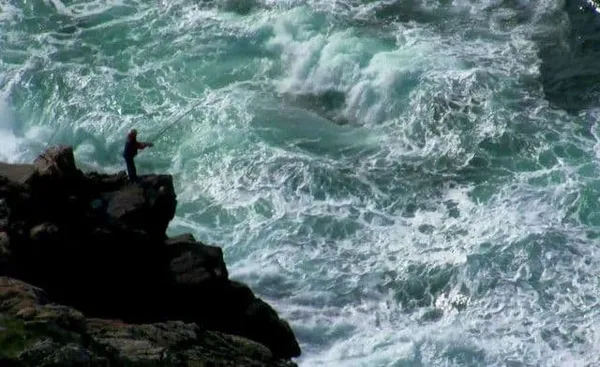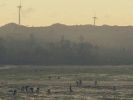Eye For Film >> Movies >> Coast Of Death (2013) Film Review
Coast Of Death
Reviewed by: Rebecca Naughten

Lois Patiño's directorial debut in many ways defies categorisation - is it a documentary, an essay film, a visual poem? - but Coast Of Death (Costa Da Morte) stands as a complex, multi-faceted portrait of the director's home region of Galicia, in north-west Spain, with imagery that is awe-inspiring in the proper sense of the term. Bradford International Film Festival held its UK premiere - if it makes it to a festival near you, or indeed if it makes its way beyond the festival circuit in the UK, it merits being seen on as big a screen as possible.
If a land is partly defined by the stories told about it, and how it exists in the imaginations of its inhabitants, Patiño shows that it is also shaped by the limits and expanses of the physical landscape and how those spaces intersect with people's daily working lives. This is a landscape that is worked and harvested, and a landscape that sustains its people through the natural resources it offers, at the same time as its history and the oral culture of stories being passed down through the generations offer another kind of rich sustenance.

Probably the most striking thing about the film - aside from the beauty of the landscapes and seascapes - is the scale at which images are presented. Waves fill the screen and trees tower above us. Patiño films from a great distance, emphasising the vastness and power of nature - the name of the coastline originates in the quantity of shipwrecks it has seen dashed upon its rocks - and rendering its human inhabitants tiny and peripheral to the natural world.
But despite our distance from the people onscreen we are nonetheless drawn close to them by sound. The sound was recorded separately, meaning that it's exceptionally clear to the extent of our being able to hear individuals breathing - there's a dichotomy at work between image and sound because while one emphasises the vastness of the space, the other offers the intimacy of being told stories almost whispered into your ear. But these two apparently dichotomous elements work in harmony to envelop the viewer in the film. Because of the physical distance created, it is not always clear which of the individuals onscreen is (supposedly) talking - we never see any people in close-up - which also gives the stories a universal quality as they seemingly belong to all, or to the land itself.
Humorous though many of the conversations are, what sticks in the mind is the beauty of Patiño's visual compositions, whether a vertiginously tall tree falling through the fog or the extinguishing of a fire in the port causing a cloud to bloom across the screen. Many of the images also carry an undertow of danger, either within the image itself - such as the men clinging to the rocks like the barnacles they're scraping off, as waves crash over their heads - or in the juxtaposition of image and sound - as in the sequence on a seemingly calm stretch of water where the men on the boat discuss recent drownings in the area. It is one of the most absorbing and visually overwhelming films I've seen.
In Bradford, the film was preceded by Lois Patiño's short film Mountain In Shadow (Montaña En Sombra), which if anything is even more visually stunning than Coast Of Death. It starts almost like an ink painting, with deep inky black shadows appearing across a backdrop that resembles rippling white silk, the skiers rendered ant-like again by the vastness of nature and the scale of the image utilised by the director. There are flashes of colour but the combination of snow and fog keep most of the film a study in monochrome. Another one worth seeking out.
Reviewed on: 08 Apr 2014















